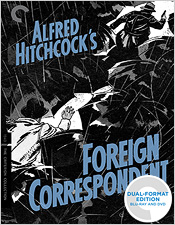Foreign Correspondent (Blu-ray Review)

Director
Alfred HitchcockRelease Date(s)
1940 (February 18, 2014)Studio(s)
Westchester Films Inc. (Criterion - Spine #696)- Film/Program Grade: A-
- Video Grade: A+
- Audio Grade: A
- Extras Grade: A
Review
Alfred Hitchcock’s move from the United Kingdom to the United States as a film director in Hollywood couldn’t have gotten off to a more successful start than it did in 1940. He directed two films back to back, both of which were up against each other at the Oscars the following year: Rebecca and Foreign Correspondent. Unfortunately, Foreign Correspondent lost its Best Picture nomination to Rebecca, as well as missing out on five other nominations including Best Writing and Best Supporting Actor. But to be newly-arrived and have two successful films, both of which were up for awards, must have been a very pleasing thing for Hitchcock. And although it isn’t as coveted as some of his other work, Foreign Correspondent wound up being somewhat of an underdog in the long run.
To be perfectly honest, Foreign Correspondent is a bit of an odd film for Hitchcock. It was written by many different people (of only whom three were actually accredited) and became a more patriotic film than he had intended. Based on the book “Personal History” by war correspondent Vincent Sheehan, the film takes place towards the beginning of World War II in Europe, and the head-strong reporter who’s sent there to seek out and report on a big story brewing there. Along the way, his political stance is toppled as he gets wrapped up in a conspiracy involving murder, betrayal and a country that’s edging closer and closer to war (albeit fictionalized).
For me, it’s a film that doesn’t fully deliver on the Hitchcock name as we know it today, but yet it does. He was getting his feet wet in a new filmmaking environment and you can see his personal touches starting to come through that would eventually lead to his total control of later films. Foreign Correspondent is a movie that a lot of people wanted to make other than the director, and what’s more, had a say as to what content would go into it and what content should come out of it. If it weren’t for Hitchcock’s very fine touches (the camera work, for example), it could have easily been just another propaganda film, of which many were being made at the time ad nauseam.
The film is also famous for its special effects (by none other than William Cameron Menzies) and its performances, particularly from Joel McCrae and Albert Bassermann. But it’s the film’s final moments that really damage what could have been a very un-propagandaish film for its time. The final scene with Joel McCrea reading a “Stars and Stripes Forever” type speech is so out of character for the story that preceded it that it feels like it’s been tacked on from another film. It was a scene that I doubt Hitchcock wanted to shoot but eventually agreed to. So the film isn’t perfect. It has some hiccups throughout the proceedings (again, the ending being the biggest hiccup), but it’s still a worthy film. It’s not one of Hitchcock’s best, but I wouldn’t call any of his work terrible in any capacity.
Criterion’s treatment of Foreign Correspondent heralds a virtually perfect presentation. Scanned from the original 35mm camera negative at 2K resolution, depth and image clarity is quite astounding. It’s a film that looks its age, but as a presentation, it’s remarkably clear and clean. Film grain is very stable and unobtrusive, blacks are deep with very good shadow delineation, and both contrast and brightness are at acceptable levels. There are no signs of digital tinkering, such as sharpening or DNR, but it’s clear to me that a thorough clean up job has been carried out because of how clean the images are. It’s a definitive presentation, for sure. In the audio department, a single English mono track is utilized, which is all that’s really necessary. Dialogue is clean and clear, always perfectly audible, and the film’s score is very crisp. Again, the soundtrack, like the video presentation, has been cleaned up considerably, so you won’t hear any obtrusive hiss or crackle. Everything is well-balanced and sounds remarkably good. Subtitles have also been included in English for those who might need them.
The supplemental material included with this release includes a video piece with special effects expert Craig Barron entitled Visual Effects in Foreign Correspondent; Hollywood Propaganda and World War II, which is an interview with writer Mark Harris; an episode of The Dick Cavett Show from 1972 containing an interview with Alfred Hitchcock, as well as a recently-filmed introduction by Cavett himself (the best extra of the lot, in my opinion); the film’s radio adaptation from 1946; Hitchcock’s own Have You Heard? The Story of Wartime Rumors, a “photo-drama” from a 1942 Life magazine; the film’s original theatrical trailer; and finally, an 18-page booklet with an essay by film scholar James Naremore.
All in all, I’d say this is the definitive home video release of Foreign Correspondent. As I said, it’s not one of the best (or even one of my personal favorite) Hitchcock films. I’ll take something like Vertigo, Rope, Frenzy or The Lady Vanishes any day of the week, but you can’t deny the artist at work here. He’s not in complete form at this stage in his career, but all of his work is valid and equally fascinating. And Criterion’s Blu-ray presentation of the film is certainly a winner. Highly recommended.
-Tim Salmons

